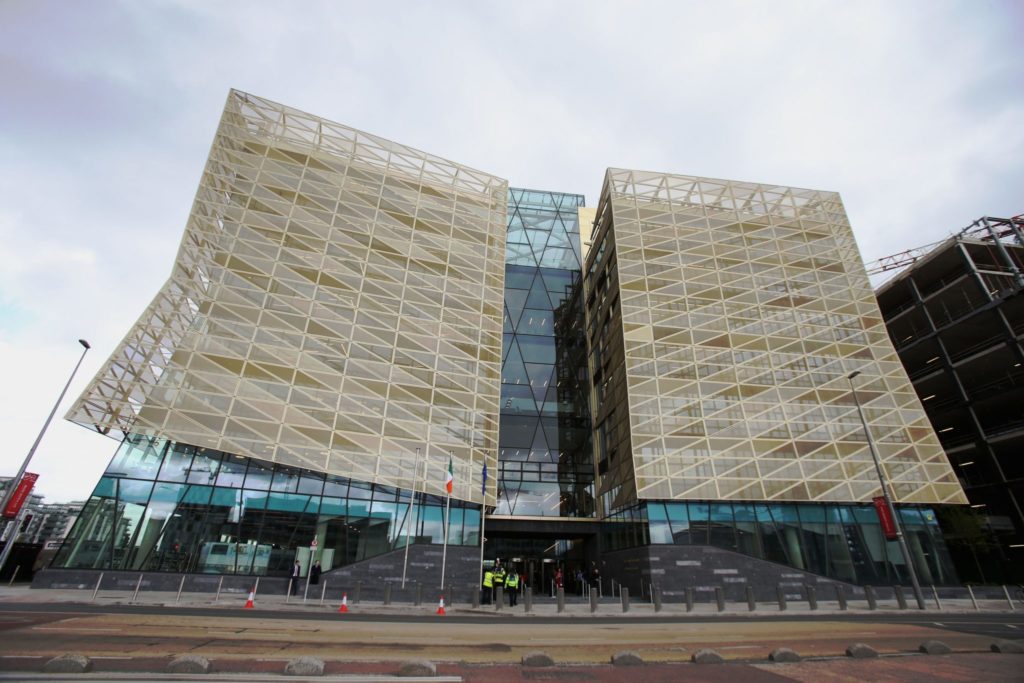The Central Bank has said more than 100,000 jobs are at risk in the medium term, in the event of a no-deal Brexit in the UK.
In its quarterly bulletin, the bank says a no-deal scenario would see a "significant weakening" of activity across many parts of the economy.
It suggests that food and agriculture would be the most vulnerable sector due to its high exposure to Britain.
It also says it could also be particularly affected by tariffs and by delays in moving goods into and out of the country.
The bank is projecting that in the event of no-deal, the Irish economy would expand by 0.7% in 2020 - as opposed to 4.1% if a deal can be agreed.
It is forecasting there will be around 34,000 fewer jobs by end 2020 and over 100,000 fewer jobs over the medium term.
"Given the unprecedented nature of Brexit, and the uncertainties in the international trading environment, there is considerable uncertainty around potential outcomes", the bank says.
 A view of the Central Bank of Ireland's Dublin Docklands headquarters | Image: Niall Carson/PA Archive/PA Images
A view of the Central Bank of Ireland's Dublin Docklands headquarters | Image: Niall Carson/PA Archive/PA ImagesOn the domestic side, it says the recent strength of growth in output and employment have further elevated the position of the economy.
"In the event that a disorderly, no-deal Brexit can be avoided, underlying economic activity is expected to perform strongly in 2019 and 20202," it adds.
In general terms, it has revised up its growth forecast for the economy - it is now expected to be 4.9% in 2019 and 4.1% in 2020.
It also says the unemployment rate is set to fall from 4.7% in 2019 to 4.5% in 2020.
Overheating the economy
But it also warns that if a no-deal Brexit is avoided, there is a "material risk" that continued strong expansion could give rise to overheating in the economy.
"Given the already cyclically advanced stage of the economy, there is a material risk that continued strong expansion could give rise to overheating and generate sustained upward wage pressures", it says.
Director of economics and statistics at the Central Bank is Mark Cassidy.
"In the event that the disruption from a no-deal Brexit is avoided, there is a risk of overheating occurring in the Irish economy given that output is now at or close to full capacity."
"The uncertainties around Brexit and managing the risk of overheating increase both the challenge and importance of charting the appropriate fiscal policy path.
"If a disorderly Brexit can be avoided, the underlying outlook and, in particular, the risk of overheating, emphasises the importance of a more ambitious improvement in the fiscal position.
"With output at or close to potential, a tighter fiscal policy would help to manage demand pressures and reduce the risk of overheating and a return to boom-bust type conditions.
"On the other hand, if a disorderly Brexit were to occur, there would be a material deterioration in the public finances and the fiscal environment would be significantly more challenging.
"In this case, there may be the need to provide targeted support to the parts of the economy that are most affected.
"However, it is important that any fiscal response is consistent with long-run debt sustainability and does not undo the hard work in re-establishing Ireland's fiscal credibility and risk the emergence of unsustainable debt dynamics."









